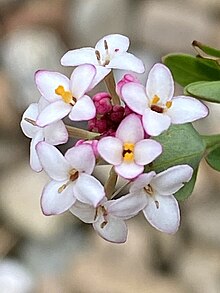Pimelea spicata
| Pimelea spicata | |
|---|---|

| |
| Scientific classification | |
| Kingdom: | Plantae |
| Clade: | Tracheophytes |
| Clade: | Angiosperms |
| Clade: | Eudicots |
| Clade: | Rosids |
| Order: | Malvales |
| Family: | Thymelaeaceae |
| Genus: | Pimelea |
| Species: | P. spicata
|
| Binomial name | |
| Pimelea spicata | |
Pimelea spicata, commonly known as the spiked rice flower, [3] is a flowering plant in the family Thymelaeaceae and is endemic to New South Wales. It is a slender plant with white flowers and elliptic leaves.
Description
Pimelea spicata is a slender upright or decumbent shrub to 50 cm (20 in) high with smooth stems. The leaves elliptic to narrowly elliptic, arranged opposite, 5–20 mm (0.20–0.79 in) long, 2–8 mm (0.079–0.315 in) wide, and pointed to rounded at the apex. The flowers are in terminal spikes up to 14 mm (0.55 in) long, single flowers about 10 mm (0.39 in) long, tubular with four rounded spreading petals, white or sometimes pinkish, borne in racemes, crowded when young, elongated at maturity, on a smooth peduncle 14 mm (0.55 in) long at maturity. Flowering occurs mostly from August to December and the fruit is a small, green, narrowly egg-shaped nut about 2.5 mm (0.098 in) long.[4][5]
Taxonomy and naming
Pimelea spicata was first formally described in 1810 by Robert Brown and the description was published in Prodromus Florae Novae Hollandiae.[6][7] The specific epithet (spicata) means "spicate".[8]
Invasive weeds which compete with the plant for resources include bridal creeper (Asparagus asparagoides), bitou bush (Chrysanthemoides monilifera), blackberry (Rubus fruticosus agg.), St John's wort (Hypericum perforatum), kikuyu (Pennisetum clandestinum), lantana (Lantana camara), African olive (Olea africana subsp. africana) and privet (Ligustrum lucidum).
References
- ^ Pimelea spicata: Threatened Species Information, NSW National Parks and Wildlife Service.
- ^ "Pimelea spicata". Australian Plant Census. Retrieved 21 October 2021.
- ^ "Pimelea spicata". Species Profile and Threats Database. Department of the Environment. Retrieved 21 October 2021.
- ^ "Pimelea spicata". PlantNET-NSW flora online. Royal Botanic Garden Sydney. Retrieved 21 October 2021.
- ^ Fairley, Alan (2004). Seldom Seen Rare Plants of Greater Sydney. Sydney: Louise Egerton. p. 157. ISBN 1876334991.
- ^ "Pimelea spicata". Australian Plant Name Index. Retrieved 22 October 2021.
- ^ Brown, Robert (1810). Prodromus florae Novae Hollandiae et insulae Van-Diemen, exhibens characteres plantarum quas annis 1802-1805. p. 362.
- ^ Sharr, Francis Aubi; George, Alex (2019). Western Australian Plant Names and Their Meanings (3rd ed.). Kardinya, WA: Four Gables Press. p. 310. ISBN 9780958034180.

